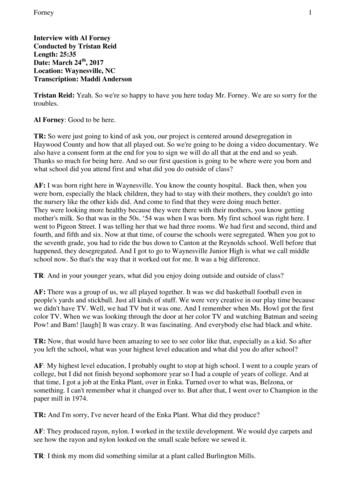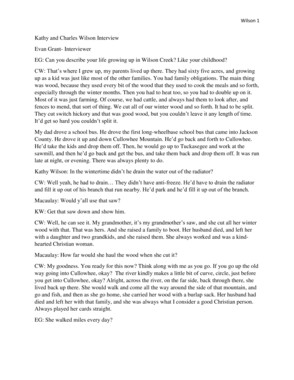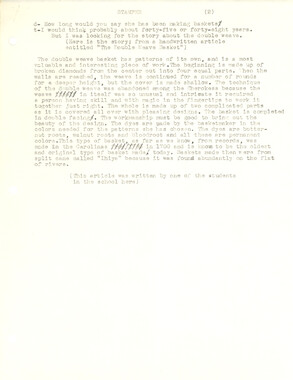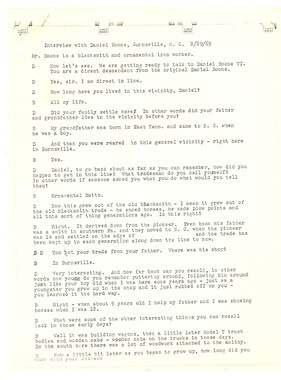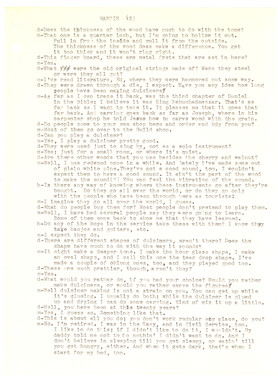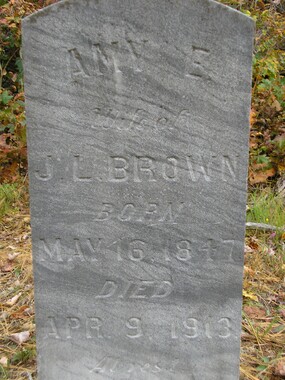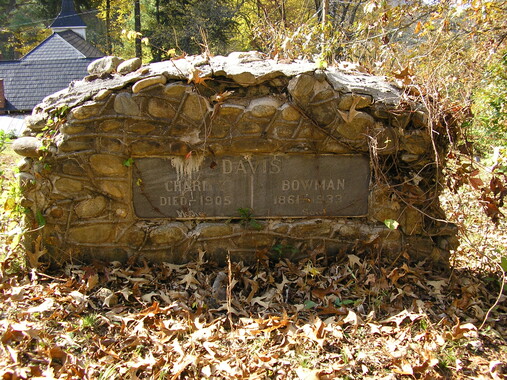Western Carolina University (20)
View all
- Canton Champion Fibre Company (2308)
- Cherokee Traditions (293)
- Civil War in Southern Appalachia (165)
- Craft Revival (1942)
- Great Smoky Mountains - A Park for America (2767)
- Highlights from Western Carolina University (430)
- Horace Kephart (941)
- Journeys Through Jackson (154)
- LGBTQIA+ Archive of Jackson County (19)
- Oral Histories of Western North Carolina (314)
- Picturing Appalachia (6679)
- Stories of Mountain Folk (413)
- Travel Western North Carolina (160)
- Western Carolina University Fine Art Museum Vitreograph Collection (129)
- Western Carolina University Herbarium (92)
- Western Carolina University: Making Memories (708)
- Western Carolina University Publications (2283)
- Western Carolina University Restricted Electronic Theses and Dissertations (146)
- Western North Carolina Regional Maps (71)
- World War II in Southern Appalachia (131)
University of North Carolina Asheville (6)
View all
- Allanstand Cottage Industries (62)
- Appalachian National Park Association (53)
- Bennett, Kelly, 1890-1974 (1295)
- Berry, Walter (76)
- Brasstown Carvers (40)
- Carver, George Washington, 1864?-1943 (26)
- Cathey, Joseph, 1803-1874 (1)
- Champion Fibre Company (233)
- Champion Paper and Fibre Company (297)
- Cherokee Indian Fair Association (16)
- Cherokee Language Program (22)
- Crowe, Amanda (40)
- Edmonston, Thomas Benton, 1842-1907 (7)
- Ensley, A. L. (Abraham Lincoln), 1865-1948 (275)
- Fromer, Irving Rhodes, 1913-1994 (70)
- George Butz (BFS 1907) (46)
- Goodrich, Frances Louisa (120)
- Grant, George Alexander, 1891-1964 (96)
- Heard, Marian Gladys (60)
- Kephart, Calvin, 1883-1969 (15)
- Kephart, Horace, 1862-1931 (313)
- Kephart, Laura, 1862-1954 (39)
- Laney, Gideon Thomas, 1889-1976 (439)
- Masa, George, 1881-1933 (61)
- McElhinney, William Julian, 1896-1953 (44)
- Niggli, Josephina, 1910-1983 (10)
- North Carolina Park Commission (105)
- Osborne, Kezia Stradley (9)
- Owens, Samuel Robert, 1918-1995 (11)
- Penland Weavers and Potters (36)
- Roberts, Vivienne (15)
- Roth, Albert, 1890-1974 (142)
- Schenck, Carl Alwin, 1868-1955 (1)
- Sherrill's Photography Studio (2565)
- Southern Highland Handicraft Guild (127)
- Southern Highlanders, Inc. (71)
- Stalcup, Jesse Bryson (46)
- Stearns, I. K. (213)
- Thompson, James Edward, 1880-1976 (226)
- United States. Indian Arts and Crafts Board (130)
- USFS (683)
- Vance, Zebulon Baird, 1830-1894 (1)
- Weaver, Zebulon, 1872-1948 (58)
- Western Carolina College (230)
- Western Carolina Teachers College (282)
- Western Carolina University (1794)
- Western Carolina University. Mountain Heritage Center (18)
- Whitman, Walt, 1819-1892 (10)
- Wilburn, Hiram Coleman, 1880-1967 (73)
- Williams, Isadora (3)
- Cain, Doreyl Ammons (0)
- Crittenden, Lorraine (0)
- Rhodes, Judy (0)
- Smith, Edward Clark (0)
- Appalachian Region, Southern (2393)
- Asheville (N.C.) (1886)
- Avery County (N.C.) (26)
- Blount County (Tenn.) (161)
- Buncombe County (N.C.) (1664)
- Cherokee County (N.C.) (283)
- Clay County (N.C.) (555)
- Graham County (N.C.) (233)
- Great Smoky Mountains National Park (N.C. and Tenn.) (478)
- Haywood County (N.C.) (3522)
- Henderson County (N.C.) (70)
- Jackson County (N.C.) (4692)
- Knox County (Tenn.) (25)
- Knoxville (Tenn.) (12)
- Lake Santeetlah (N.C.) (10)
- Macon County (N.C.) (420)
- Madison County (N.C.) (211)
- McDowell County (N.C.) (39)
- Mitchell County (N.C.) (132)
- Polk County (N.C.) (35)
- Qualla Boundary (981)
- Rutherford County (N.C.) (76)
- Swain County (N.C.) (2020)
- Transylvania County (N.C.) (247)
- Watauga County (N.C.) (12)
- Waynesville (N.C.) (68)
- Yancey County (N.C.) (72)
- Aerial Photographs (3)
- Aerial Views (60)
- Albums (books) (4)
- Articles (1)
- Artifacts (object Genre) (228)
- Biography (general Genre) (2)
- Cards (information Artifacts) (38)
- Clippings (information Artifacts) (191)
- Crafts (art Genres) (622)
- Depictions (visual Works) (21)
- Design Drawings (1)
- Drawings (visual Works) (184)
- Envelopes (73)
- Facsimiles (reproductions) (1)
- Fiction (general Genre) (4)
- Financial Records (12)
- Fliers (printed Matter) (67)
- Glass Plate Negatives (381)
- Guidebooks (2)
- Internegatives (10)
- Interviews (811)
- Land Surveys (102)
- Letters (correspondence) (1013)
- Manuscripts (documents) (619)
- Maps (documents) (159)
- Memorandums (25)
- Minutes (administrative Records) (59)
- Negatives (photographs) (5735)
- Newsletters (1285)
- Newspapers (2)
- Occupation Currency (1)
- Paintings (visual Works) (1)
- Pen And Ink Drawings (1)
- Periodicals (193)
- Personal Narratives (7)
- Photographs (12982)
- Plans (maps) (1)
- Poetry (5)
- Portraits (1657)
- Postcards (329)
- Programs (documents) (151)
- Publications (documents) (2237)
- Questionnaires (65)
- Scrapbooks (282)
- Sheet Music (1)
- Slides (photographs) (402)
- Sound Recordings (796)
- Specimens (92)
- Speeches (documents) (15)
- Tintypes (photographs) (8)
- Transcripts (322)
- Video Recordings (physical Artifacts) (23)
- Vitreographs (129)
- Text Messages (0)
- A.L. Ensley Collection (275)
- Appalachian Industrial School Records (7)
- Appalachian National Park Association Records (336)
- Axley-Meroney Collection (2)
- Bayard Wootten Photograph Collection (20)
- Bethel Rural Community Organization Collection (7)
- Blumer Collection (5)
- C.W. Slagle Collection (20)
- Canton Area Historical Museum (2110)
- Carlos C. Campbell Collection (282)
- Cataloochee History Project (65)
- Cherokee Studies Collection (4)
- Daisy Dame Photograph Album (5)
- Daniel Boone VI Collection (1)
- Doris Ulmann Photograph Collection (112)
- Elizabeth H. Lasley Collection (1)
- Elizabeth Woolworth Szold Fleharty Collection (4)
- Frank Fry Collection (95)
- George Masa Collection (173)
- Gideon Laney Collection (452)
- Hazel Scarborough Collection (2)
- Hiram C. Wilburn Papers (28)
- Historic Photographs Collection (236)
- Horace Kephart Collection (861)
- Humbard Collection (33)
- Hunter and Weaver Families Collection (1)
- I. D. Blumenthal Collection (4)
- Isadora Williams Collection (4)
- Jesse Bryson Stalcup Collection (47)
- Jim Thompson Collection (224)
- John B. Battle Collection (7)
- John C. Campbell Folk School Records (80)
- John Parris Collection (6)
- Judaculla Rock project (2)
- Kelly Bennett Collection (1314)
- Love Family Papers (11)
- Major Wiley Parris Civil War Letters (3)
- Map Collection (12)
- McFee-Misemer Civil War Letters (34)
- Mountain Heritage Center Collection (4)
- Norburn - Robertson - Thomson Families Collection (44)
- Pauline Hood Collection (7)
- Pre-Guild Collection (2)
- Qualla Arts and Crafts Mutual Collection (12)
- R.A. Romanes Collection (681)
- Rosser H. Taylor Collection (1)
- Samuel Robert Owens Collection (94)
- Sara Madison Collection (144)
- Sherrill Studio Photo Collection (2558)
- Smoky Mountains Hiking Club Collection (616)
- Stories of Mountain Folk - Radio Programs (374)
- The Reporter, Western Carolina University (510)
- Venoy and Elizabeth Reed Collection (16)
- WCU Gender and Sexuality Oral History Project (32)
- WCU Mountain Heritage Center Oral Histories (25)
- WCU Oral History Collection - Mountain People, Mountain Lives (71)
- WCU Students Newspapers Collection (1744)
- Western North Carolina Tomorrow Black Oral History Project (69)
- William Williams Stringfield Collection (2)
- Zebulon Weaver Collection (109)
- African Americans (388)
- Appalachian Trail (35)
- Artisans (521)
- Cherokee art (84)
- Cherokee artists -- North Carolina (10)
- Cherokee language (21)
- Cherokee pottery (101)
- Cherokee women (208)
- Church buildings (166)
- Civilian Conservation Corps (U.S.) (110)
- College student newspapers and periodicals (1830)
- Dams (95)
- Dance (1023)
- Education (222)
- Floods (60)
- Folk music (1015)
- Forced removal, 1813-1903 (2)
- Forest conservation (220)
- Forests and forestry (917)
- Gender nonconformity (4)
- Great Smoky Mountains National Park (N.C. and Tenn.) (154)
- Hunting (38)
- Landscape photography (10)
- Logging (103)
- Maps (84)
- Mines and mineral resources (8)
- North Carolina -- Maps (18)
- Paper industry (38)
- Postcards (255)
- Pottery (135)
- Railroad trains (69)
- Rural electrification -- North Carolina, Western (3)
- School integration -- Southern States (2)
- Segregation -- North Carolina, Western (5)
- Slavery (5)
- Sports (452)
- Storytelling (245)
- Waterfalls -- Great Smoky Mountains (N.C. and Tenn.) (66)
- Weaving -- Appalachian Region, Southern (280)
- Wood-carving -- Appalachian Region, Southern (328)
- World War, 1939-1945 (173)
Interview with Alvin Forney
Item
Item’s are ‘child’ level descriptions to ‘parent’ objects, (e.g. one page of a whole book).
-
-
Forney 1 Interview with Al Forney Conducted by Tristan Reid Length: 25:35 Date: March 24th, 2017 Location: Waynesville, NC Transcription: Maddi Anderson Tristan Reid: Yeah. So we're so happy to have you here today Mr. Forney. We are so sorry for the troubles. Al Forney: Good to be here. TR: So were just going to kind of ask you, our project is centered around desegregation in Haywood County and how that all played out. So we're going to be doing a video documentary. We also have a consent form at the end for you to sign we will do all that at the end and so yeah. Thanks so much for being here. And so our first question is going to be where were you born and what school did you attend first and what did you do outside of class? AF: I was born right here in Waynesville. You know the county hospital. Back then, when you were born, especially the black children, they had to stay with their mothers, they couldn't go into the nursery like the other kids did. And come to find that they were doing much better. They were looking more healthy because they were there with their mothers, you know getting mother's milk. So that was in the 50s. ‘54 was when I was born. My first school was right here. I went to Pigeon Street. I was telling her that we had three rooms. We had first and second, third and fourth, and fifth and six. Now at that time, of course the schools were segregated. When you got to the seventh grade, you had to ride the bus down to Canton at the Reynolds school. Well before that happened, they desegregated. And I got to go to Waynesville Junior High is what we call middle school now. So that's the way that it worked out for me. It was a big difference. TR: And in your younger years, what did you enjoy doing outside and outside of class? AF: There was a group of us, we all played together. It was we did basketball football even in people's yards and stickball. Just all kinds of stuff. We were very creative in our play time because we didn't have TV. Well, we had TV but it was one. And I remember when Ms. Howl got the first color TV. When we was looking through the door at her color TV and watching Batman and seeing Pow! and Bam! [laugh] It was crazy. It was fascinating. And everybody else had black and white. TR: Now, that would have been amazing to see to see color like that, especially as a kid. So after you left the school, what was your highest level education and what did you do after school? AF: My highest level education, I probably ought to stop at high school. I went to a couple years of college, but I did not finish beyond sophomore year so I had a couple of years of college. And at that time, I got a job at the Enka Plant, over in Enka. Turned over to what was, Belzona, or something. I can't remember what it changed over to. But after that, I went over to Champion in the paper mill in 1974. TR: And I'm sorry, I've never heard of the Enka Plant. What did they produce? AF: They produced rayon, nylon. I worked in the textile development. We would dye carpets and see how the rayon and nylon looked on the small scale before we sewed it. TR: I think my mom did something similar at a plant called Burlington Mills. Forney 2 AF: Yeah probably similar to that. There was spinning pot spinning and all kind of things going on. TR: So could you describe what a normal day was like? What were the classes like here? AF: Wow. That’s about too far back for me. But I was telling her, we were in first and second. So when I was in the first grade, I would listen because she would work on, Ms. Howl was the teacher, Marian Howl and she kept discipline. She was a stern disciplinarian. I mean you didn't cut up in her class. You didn't do anything to make it bad for the other classes because there was maybe 15 people in the whole two classes. And if you paid attention you could learn what next year was going to be like. So after the second grade, you go to Miss Osborne, Miss Elsie Osborne’s room, she as third and fourth. She wasn't as strict but she was still pretty strict. [laugh] You know, there’s no goofing off. We all had to learn, and the classes were, I can't even remember what they were like. You know it's been so long ago. But it was just reading and writing and arithmetic you know. And I remember reading run Dick and Jane and watch Spot run you know kind of just repetitive type. TR: So did you have like different types of different types of classes, or were all of the classes with one teacher similar to the way elementary schools are today? AF: They were all similar. They weren’t different any more than just reading and learning different types of things. They didn't teach us how to pass tests back then, they taught us everything. It worked out better for us because when the test came there was no you know, what in the world is this? We’d had that before so it was easy. It was easier when we got together. TR: And I'm assuming you guys played outside. AF: Oh yeah, the big ball field. Oh man, we played softball, baseball, basketball all kind of good stuff down there. We had some good times down in the field. Even in school and even after we would eat here in the cafeteria instead of us, you know, laying around sleeping. The basic thing was out to play ball. Play basketball, we had a ball. TR: And so we've heard, we've read stories where there were different ethnicities teaching at African-American schools. Was that a part of your experience? Were most of your teachers African-Americans? AF: No. All my teachers were African-Americans. After we got out of Ms. Osborne’s room we had Mr. Bryant. Mr. James Bryant. He was, they was not afraid to use the paddles and rulers, whatever they could get their hands on, they would beat you with. And if we did have, and I told my wife, I think we did have this ADHD, but they beat it out of us [laughs]. We were calmed down, yeah. TR: So based on your experience, how are African-Americans treated in Haywood County during that time? AF: During the time that we were here? TR: Yes. Yeah Sir. And even as you grew up and went to the middle school. AF: Well, it was almost second class citizens because, when we went to town, if we wanted something to eat, they would have to fix it for us and hand it out the door. You know we couldn't go in and sit down until the late 60s and I remember my buddies and I, It's first time I’ve told anybody so y’all don’t show this to my mama. We would get on the bus and ride to Asheville where it was more black people and we could go in and Cressida. I don’t even think Cressida is there, it was like Forney 3 a drugstore. We'd go in and get cheeseburgers and sit down and eat in there because they were so many more black people. And then we’d hop the bus and come on back home. It was a good experience. To see more blacks. Especially us being on the bus. When we got on a bus, of course, you had to go to the back side of the bus. Even Greyhound. Greyhound being about the only ones. Trailway wouldn't let you ride. It was Greyhound. TR: So I guess our next question would be how did African-Americans in Haywood County react to desegregation of the schools. Based on our research, we've seen that a lot of African-Americans liked being in the schools with students that they could relate to and the teachers were also a lot of times African-American so they could relate to the students and just relate to them in a different way. Yeah. And so what was the reaction from you and your friends? AF: Well some of us, I will never forget before the year before we were getting ready to desegregate. There was this lady that came here and gave music tests to see if any of us were qualified to be in the band. I think they picked two people maybe one out of the whole school. But of those that they didn’t pick there were bass guitar players. There were piano players. There were drummers. And they weren’t picked. There was one, I remember he was a very good friend of mine, still is. But he got to get in there in it and I was kind disappointed thinking like, man out of all these people there ain’t but one person capable to learn music. I think nowadays anybody can learn music if they want to. And I looked at it as then as a way to keep us separate even when we went into these junior high I never had any of the people that I was with here in my classes and it seemed like the segregated us still by not letting us have the same class. Only classes like we would have together was maybe like gym? But as far as sitting down in another class, were all we were always separate. TR: So it would only be one of you guys? AF: Two at the most. That would be a very good score for us. TR: I had a question I wanted to ask you about that. And so you amongst you and your friends, when that happened, you would have rather have been going to…. AF: I had rather been going to Reynolds. I really had because I felt like it broke down our community as a whole and it wasn't good for us because… It broke. It broke up the churches and the schools and everything else. The only thing that we did have later on was the church. My buddies and I, we were just separated. We were put off into different areas and singled out. TR: So did you guys still get to hang out after school? AF: After school maybe we got back here in our neighborhood then did we play then. But it was one side of town against the other side of town. It was not good really. It wasn’t a very good time. TR: Now were you aware of the greater national struggles relating to school desegregation? AF: Well not until later because what I realized was that the schools were supposed to be integrated here a couple or three years before it actually happened. They were ohhhh we don't have the money blah blah blah. But I remember when we were in school we always got the books that were signed all the way out, does that make any sense to you [laugh]. You had some inside cover and we got some where most of ours never had a place to sign. They was all used up. So when I got into the other school, once we integrated. I was like, “hey I can sign right here.” I couldn’t believe it. You know a whole lot of difference. Forney 4 TR: Wow. And you know I've read a lot about how you guys got the older books and things like that. AF: Yeah. Yeah. So we really had to be very meticulous with them and not lose them not tear them because we realized that the next class down the road was going to have to use the same book that we used. TR: So how long do you think, you probably can’t remember that, but how long do you think the books were in rotation here after being in rotation for…? AF: I don't know. There was there were so many of them if I could see in my mind's eye just maybe a couple or three more after the thing that signed in. Yeah before we got em. These books were old. TR: So when desegregation of schools occurred, what school did you attend next? Was it the middle school? AF: Yeah I went to Waynesville Junior. We called it Waynesville Junior High. It was from 7th to the 9th grade and then Tuscola was 10, 11, and 12. Right now I think it’s separated some other way now. TR: And you talk a little bit about, but when you first had to go to the new middle school, how receptive amongst your new peers were, was anybody nice? Was there anybody that stood out to you any teachers? AF: The teachers were real good. I remember I had Miss Hart and Ms. Brookshire when I was in 7th grade. Ms. Hart taught a combination of humanities. She did English, history, and literature or something like that. And then Ms. Brookshire did science and stuff like that. You know we have a gym class and it seemed like it was it was good. I enjoyed it but there was a few people that I could get close to. But a lot of them were [stand]offish. But the thing that got them more than anything is that I scored just as well as they did on some of the tests, on most of the tests, even better than they did. And so that way they sort of come around you know like, he ain’t just a dumb… he's as smart as anybody else. And I let them see that you know we're all the same here. TR: And as long as you give them that chance. AF: As long as you give them the chance or a decent chance you know. TR: So we've already compared him a little bit but besides the newer books, what do you think the big biggest differences were in terms of African-American schools and modern [white] schools at the time? AF: Differences, I think was in the black schools. We were forced to learn. I mean we were going to learn. I mean there was no way that we are going to hip hop our way through. And then when we got to the other school they didn’t care whether we got it or not cause they were getting paid the same thing. And they would like for you to fail because, “I taught the rest of them, they didn't learn you know we need to move them over into a special education or you know whatever because they can't learn.” But we all could learn just at different rates. Everybody learns in a different way. Sometimes you have to present it to them in a different way. TR: So when you went to the new school you had to want it for yourself. AF: Yeah yeah. And I've always, my mom and dad always told me for me to be as good, to be Forney 5 average I had to be better than them. You know I would be considered average then. So I always tried, I always done my best to excel in everything that I wanted to do. I wanted to be in the Dean’s list. I wanted to be you know in the honor society. I wanted to do all those things and let them know, hey this guy here is just as smart as anybody else. There is no way we should discriminate against. But still I was. It didn’t make much difference. TR: So where did you go to college for two years? AF: I went to the Go Get ‘em Catamounts. [laugh] Yeah I was out there when there was the Eagle Moss and Jerry Gaines, and Sam Greene, and Herb Watts. Those are the groups of guys that I was with when they were out there. You know it was pretty cool. I enjoyed it. It was different. I had a roommate for a change first time and it was like, oh my gosh. I had one that wanted to go and repel off of Bear Lake. I believe it was the closest one. And I said no buddy. I don’t want to get in an accident. But he loved it. and I thought, you go for it brother. Go for it. TR: And so talking about some similar things as we talked about with this building and your middle school, how's was Western's campus? And was it any more accepting or less accepting? AF: Western was great. I kinda loved it too much. [laugh] I only made it two years. But it was gorgeous. They were nice people. Everybody accepted you. I mean it was just good. It was a great experience. I think everybody ought to have the experience that I had by going to college at least a couple of years and to see if that's what you want to do or not. TR: So that must have been amazing to be there. When you share your space with only one person. AF: Well I had a roommate. His name was Glover. Glover was a pitcher and it seemed Glover was hardly ever in my room except in the morning when I got up to go to class, there he lay. I was like “man, where iin the world you been?” I'd lock the doors. And I did an essay on him and my essay was, “I think my roommate is a vampire.” Does he come in through the window? I’d hardly ever see him but he was a baseball player and he worked on it and he was under I think Coach Haywood was his coach. TR: Still today the athletes are always gone. Workouts in the morning. AF: Workouts in the morning and in the afternoon they hardly ever there. TR: So when desegregation occurred, did African-Americans remain in Haywood County? Or did some leave? If they did leave, where did they go and why if you know? AF: Yeah. The ones that I know, most of us got a job at this mill. The ones that could and wanted to, and some of them would cuddle up for money so that they could go somewhere else. I had a friend this friend of mine that was mentioned earlier he went to you UNC Chapel Hill and he became a lawyer so he moved away. I think he lives in San Antonio, Texas right now. And he comes back to see his mother every once in a while. I visit with him and everything. It’s good. I like and I'm glad to see that he did that. But a lot of it, the thing that scares me, and I know it happens all the time, but most of the people that I come through this this school with died are dead. Have done something that was really stupid and wound up in a bad place. It's all because of the choices that you make. You know and it seems like a hard line to make, but we are where we are because of the choices that we make. It ain’t somebody else, “Oh they done me wrong” you know. No you did it to yourself. TR : It’s a hard situation. Forney 6 AF: It is, it’s a hard one to see. TR: And so do you remember anything about the teachers. Like did you have a favorite teacher throughout your entire school career? AF: I had several, I had several. There was an algebra teacher her name was Mrs. Edwards. She taught me Algebra I, I did Algebra I in the 9th grade and she taught me Algebra II and she was cool, I enjoyed her. She was a good lady. And also another woman that stood out was Miss Phoenix, Edith Phoenix, she was a History teacher. She was the first one that guided me even in these schools to go and check out black history. I was like, what in the world, and I got to looking and I was like oh my gosh. Nobody ever taught us this before. Miss Phoenix was the one that led me the path. I found out there was black cowboys, there was buffalo soldiers, there was all kinds of things. All kinds of inventions done by black people. And I love Ms. Phoenix for that. She sent me in that direction to find out that the history that I have learned over the years was this rose colored glass history where they just want to teach you what they want to know what they wanted you to know. They didn't tell us that Columbus was an evil tyrant. [laugh] “He was a great man.” No we wasn’t. He wasn’t all that great. If you get to looking into his life, studying, you find that he wasn’t no better nobody else. He made people do this and… And the reason most of them came up here was because it was to search for gold He didn’t care about the people. So Miss Phoenix really got me… she opened my mind to black history. TR: That’s almost all of our questions on our short list, but a big part of this is things that we haven’t asked and things that you feel are important. So is there anything we didn't talk about and I'm sure there could be a lot, that you are important to you? We would love to know it, just from your childhood and schools here. AF: I think the learning experience that I had in this school helped me for the next school you know and the next school, made me learn about people. When we were here, white people were singular. Every once and a while we’d see one. Wow. And they’d come visit. I can't remember what her name was but she was, Miss Wolfe was her name, she was a disabled lady and she was very, very, very nice to everybody and it made me feel good to know that they are people in this world who loves everybody no matter what. And I realized that if Miss Wolfe could do it anybody could do it. And then some of the teachers that I had. They were just phenomenal. I enjoyed everything. All my classes, all my… lots of my classmates. Some of them I still see nowadays and I'm wondering. I talked to one guy, he says he was in you class. I said no you wasn’t. We got to looking and he was. We graduated the same year. I was like, I never saw you. There was so many more people in the classes. Like when I graduate there might have been 300 people in the graduating class at Tuscola. And there was someone… I lost my train of thought. I was in the honor society like I told you and I was a junior marshal with Marlene Hyatt who is a judge for this area. Yeah and I was like oh man that's really cool. And she and I were good friends. It always seemed like the women were more accepting than the men were. I don’t know why but it's like they just they just were. Yeah. TR: And we're so glad you talked to us today and you gave us so much valuable information. We hope we hope to put it in a documentary and we don't know. None of us have really any video skills and so we'll have to figure it out as we go. So and yeah. We really appreciate you and if we have more questions. AF: Call me anytime. TR: Yes, sir.
Object
Object’s are ‘parent’ level descriptions to ‘children’ items, (e.g. a book with pages).
-
Al Forney was born in Waynesville in 1954. He attended the Pigeon Street School in his earliest years. Forney recalls how the staff at Pigeon Street School were strict yet loving. Teachers expected all their students to learn because they believed they were capable. Forney remembers playing sports after school with his friends in the field near the school. When Haywood County Schools integrated in 1967 in the period of desegregation, Forney went on to attend middle school at Waynesville Junior High. Upon graduating from Tuscola High School, Forney was a student at Western Carolina University for two years. In 1974, Forney began working for Champion Paper Mill in Canton where he still works today. Forney recalls how, although he was academically successful in the newly integrated schools, the loss of the Pigeon Street School hurt the African American community in Waynesville. People who used to do everything together no longer saw each other quite as much. Today Al Forney is involved with the Pigeon Multicultural Dev
-
